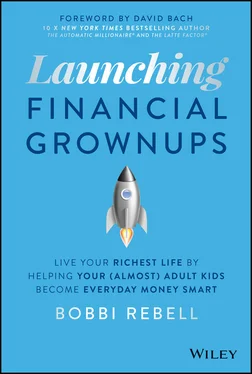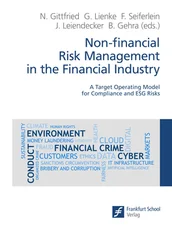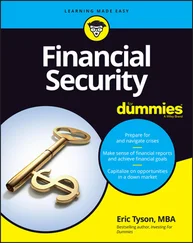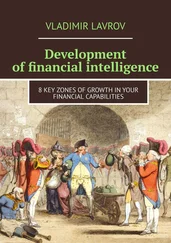Bobbi Rebell - Launching Financial Grownups
Здесь есть возможность читать онлайн «Bobbi Rebell - Launching Financial Grownups» — ознакомительный отрывок электронной книги совершенно бесплатно, а после прочтения отрывка купить полную версию. В некоторых случаях можно слушать аудио, скачать через торрент в формате fb2 и присутствует краткое содержание. Жанр: unrecognised, на английском языке. Описание произведения, (предисловие) а так же отзывы посетителей доступны на портале библиотеки ЛибКат.
- Название:Launching Financial Grownups
- Автор:
- Жанр:
- Год:неизвестен
- ISBN:нет данных
- Рейтинг книги:5 / 5. Голосов: 1
-
Избранное:Добавить в избранное
- Отзывы:
-
Ваша оценка:
- 100
- 1
- 2
- 3
- 4
- 5
Launching Financial Grownups: краткое содержание, описание и аннотация
Предлагаем к чтению аннотацию, описание, краткое содержание или предисловие (зависит от того, что написал сам автор книги «Launching Financial Grownups»). Если вы не нашли необходимую информацию о книге — напишите в комментариях, мы постараемся отыскать её.
Launching Financial Grownups
Launching Financial Grownups
Launching Financial Grownups
Launching Financial Grownups — читать онлайн ознакомительный отрывок
Ниже представлен текст книги, разбитый по страницам. Система сохранения места последней прочитанной страницы, позволяет с удобством читать онлайн бесплатно книгу «Launching Financial Grownups», без необходимости каждый раз заново искать на чём Вы остановились. Поставьте закладку, и сможете в любой момент перейти на страницу, на которой закончили чтение.
Интервал:
Закладка:
Gen X parents also often have more in common with our kids. Many of us get along with our adult children better than previous generations. Thanks to technology, we have more interaction with them, are more accessible when they need us, and can be more involved in their lives. Modern cultural values and priorities have brought us closer in so many wonderful ways, as parents today are intentionally more active in their kids' lives.
All this makes the idea of pulling away from something that has become so much of our identity painful and uncomfortable for many of us. We like our kids. Equally important, our kids often like us and enjoy being around on a more regular basis. They aren't as eager to cut ties as soon as they reach each adulting milestone, like high school or college graduation. In some ways, we are heading into a multigenerational society where family members of various generations live and spend time together in a more fluid fashion. There is so much good coming from this, but it also complicates how we transition the next generation into adulthood.
I have interviewed many of the top parenting experts, financial therapists, and money experts in the world and am so excited to share their incredible observations on the trends that have been shaping parent-child financial relationships. The advice they share on how we can best navigate the changing landscape will prove invaluable to all of us as we go through this journey. However, we must also do the work and make some tough decisions. It is essential that we come to terms with the fact that becoming a financial grownup ourselves is no longer enough. We as parents and grandparents must bring the next generations with us. But the thinking on exactly how to do so has had a massive shift for a number of reasons that we will get into soon.
It is becoming more apparent that changing cultural expectations have impacted our approach as to how our kids will separate from us economically and why that has become so complicated. The COVID-19 crisis has added a new wrinkle to the trend but has also opened up new lines of communication about finances that are proving very helpful. In previous generations, kids were expected to function as adults by their late teenage years. But our current parental expectations and realities leave many bewildered. Several families I have spoken to for this book have told me, often in confidence, that their 20-something and sometimes 30-something offspring are still very much economically dependent on them. The parents are exhausted and distressed. They worry how their kids will fare if something were to happen to them. They wonder if the kids will be able to step up in a family emergency. Parents are deeply concerned about their kids but also are becoming truly scared for their own financial futures.
The COVID-19 Boomerang
The COVID-19 pandemic has further amplified this issue for many families. Adult children moved back home during what was also an economic crisis. In some cases, they were being forced out of prolonged adolescence because their parents and/or grandparents need them to step up and care for them medically or financially – in some cases both. How prepared the younger generation was for this varied, and they often wished their parents had prepared them better for what was a shock to the system. They were forced to grow up and be financially responsible for someone other than themselves – when some had not even been fully financially responsible for themselves yet.
Some families experienced the opposite. Young adults moved home and into their childhood bedrooms and the family slid into old habits, including financial dependence. Meals were there for them, laundry was done, and life was good. Childhood perks are so much more appreciated as an adult! But after the initial adjustment period, an evolution of family roles began to happen for many families living in newly formed multigenerational living situations.
Many parents have told me adult offspring moving home was the silver lining to come out of COVID-19. Getting to know their kids as adults was wonderful, and they were happy to (temporarily) revisit their old family routines – only it was better in some ways. For the first time, they weren't competing with their kids' social plans to get them to sit down for dinner. They weren't rushing off to different events and activities. There was time. Lots of time.
What was most fascinating were the stories I heard about how the unexpected move home allowed parents insights into how well-prepared kids were to be financial grownups. It opened up opportunities to have conversations about economic realities that were not part of the parent–child relationship before, in part because everyone – parents and kids – had been totally overscheduled and overworked. Kids were in the room while their parents had open and honest discussions about financial challenges, which helped them better appreciate their parents' experiences. Likewise, parents got a better sense of how well their kids had been managing real-world money choices.
Remember, this was not the case where all the young adults were moving home for economic reasons, although that was often a big factor through no fault of their own. It wasn't about an adulting failure – financial or otherwise. They were moving home for both their and their parents' health and safety. Many families were able to leverage this season of their lives into an opportunity to build stronger financial foundations as a family. Total costs often came down because everyone was home so much. It opened up communication lines in ways that could not have come about through the normal course of events in “the before times,” as we have started to call the pre-COVID period. It was a unique, unplanned experience that often presented exceptional challenges but also unexpected relationship and financial benefits.
Stepping Up as Stakeholders
As the grownup, you are ultimate stakeholder in your kids' success behind only the child themselves. In the Introduction, I shared the story that inspired the book: trying to get my kids to open up a Roth IRA before the deadline, only to be met with indifference and apathy. We often assume that kids are motivated and interested in having more money. But in many cases, especially if they have not had to worry about money, there is little incentive to take action. All their bills are paid. In fact, the bills are often never even seen. They take money for granted because they don't have skin in the game and have not been asked to contribute. The money is just there for them.
I've done dozens of interviews for this book precisely because even though I am a CFP ®professional, I've struggled so much with this issue. My own kids have shown little to no interest in money at times. They have always had what they needed, and until recently my husband and I have kept them largely in the dark about our specific financial concerns. We wanted to protect them. We wanted to protect our privacy. We wanted them to feel secure. We never wanted them to know when we felt financially insecure. And frankly, sometimes we paid because we wanted those things more than they did.
A successful money manager who was a guest on my podcast confessed that he bought his kids cars as soon as they were old enough to drive even though they had not earned them. Frankly, he wasn't confident they would even take great care of them. He and his wife simply didn't want to be driving the kids around anymore. He absolutely thought the kids should have earned the money to pay for at least part of the cars, and he wanted them to pay for things like gas and insurance. At the end of the day, though, he didn't have a way to really enforce that because the kids knew the dad wanted them to have the transportation.
He's not alone. Many of us have used our financial resources to push our kids to do things that we believe will benefit them or to serve our own sense of what they “should” be doing. I know we are not the first parents to take a giant gulp and enroll our kids in lessons they want no part of.
Читать дальшеИнтервал:
Закладка:
Похожие книги на «Launching Financial Grownups»
Представляем Вашему вниманию похожие книги на «Launching Financial Grownups» списком для выбора. Мы отобрали схожую по названию и смыслу литературу в надежде предоставить читателям больше вариантов отыскать новые, интересные, ещё непрочитанные произведения.
Обсуждение, отзывы о книге «Launching Financial Grownups» и просто собственные мнения читателей. Оставьте ваши комментарии, напишите, что Вы думаете о произведении, его смысле или главных героях. Укажите что конкретно понравилось, а что нет, и почему Вы так считаете.












